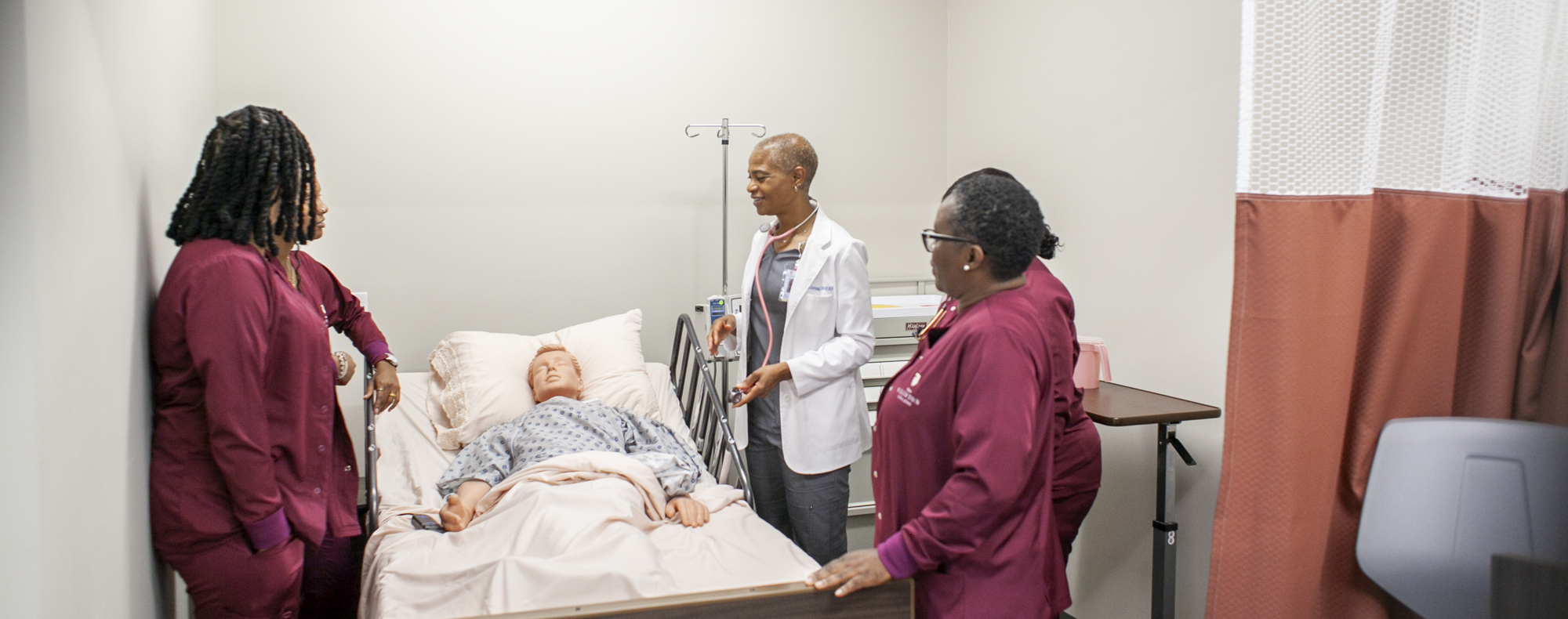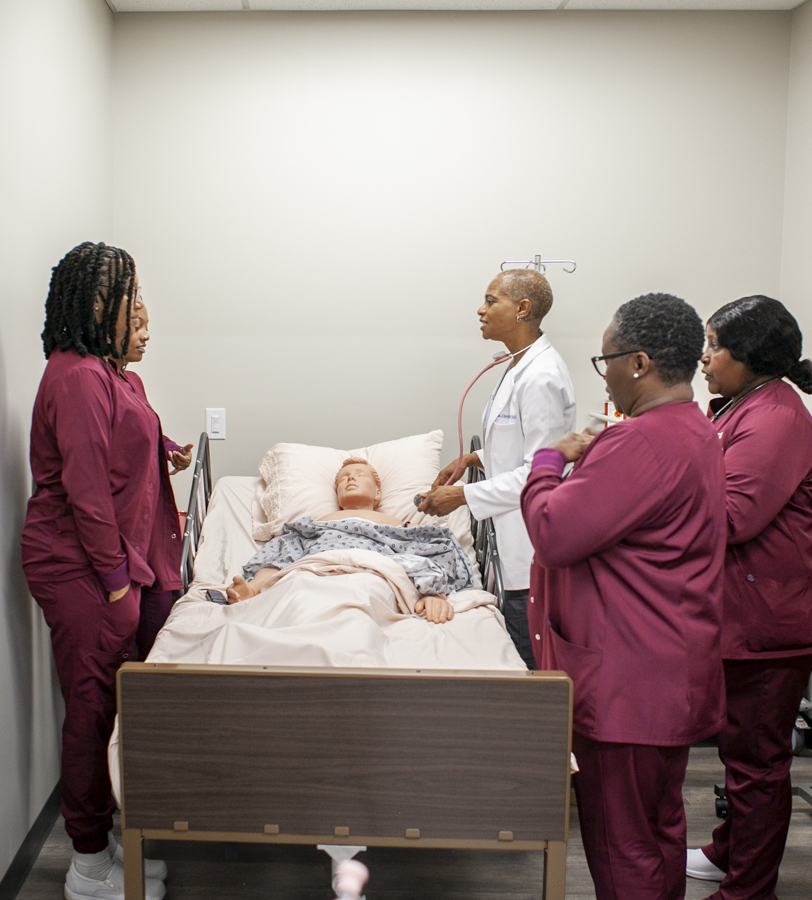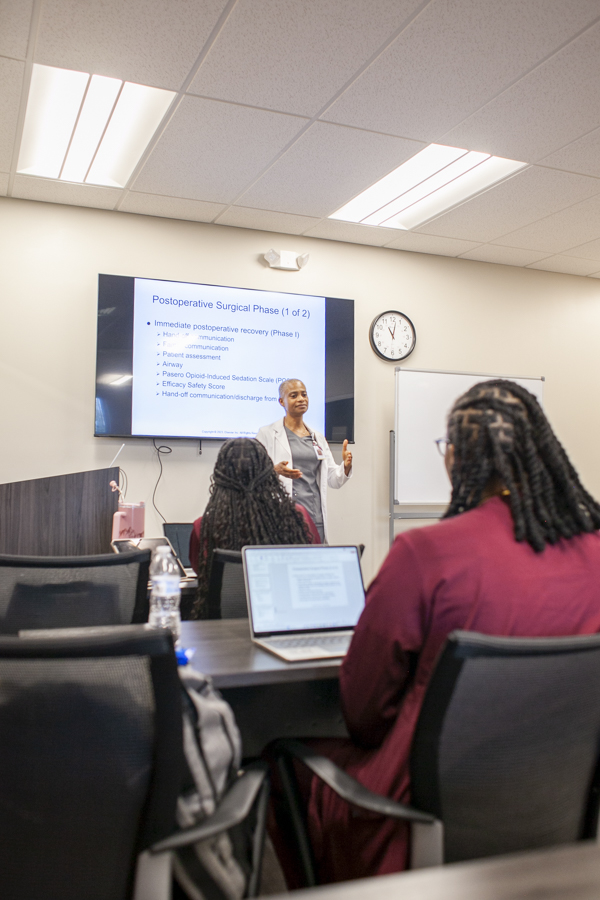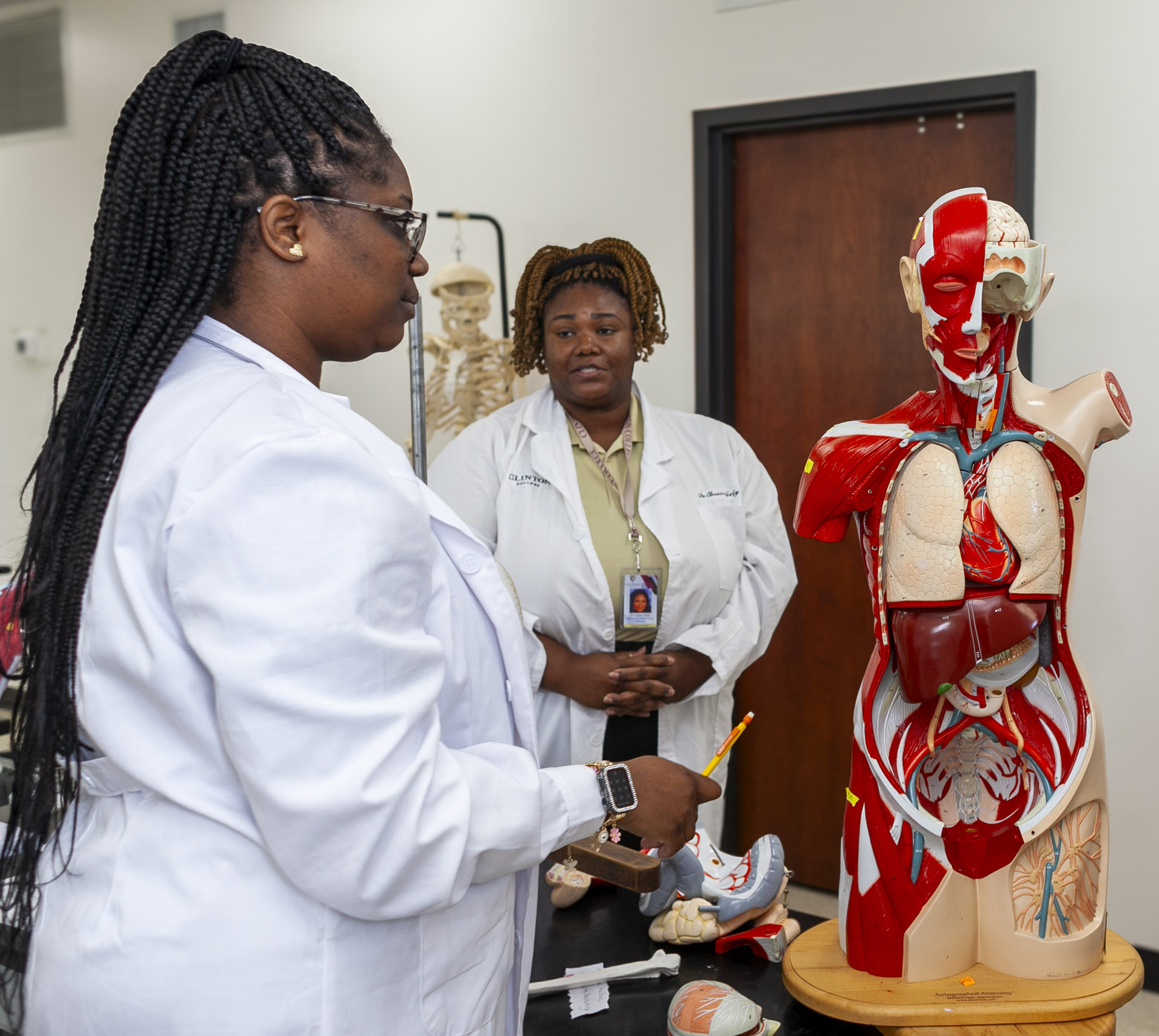
The Nursing program at Clinton College prepares students for rewarding careers in healthcare with a curriculum focused on compassionate care, clinical excellence, and leadership. As one of the leading nursing colleges in South Carolina, we prepare our students to excel in diverse healthcare settings. Among the nursing schools South Carolina is known for, our program stands out for its commitment to community-focused healthcare and personalized student support. Whether you’re just starting or advancing your education, Clinton offers one of the most comprehensive nursing programs in South Carolina to help you achieve your goals.
Program Mission
The mission of the Bachelor of Science in Nursing will promote holistic health within the community through programming aligned with the mission and heritage of the college. We endeavor to provide a professional nursing program where graduates safely lead enthusiastically and positively impact communities through the practice of nursing. The program will increase the number of qualified registered nurses available to serve as professionals in a global society and increase diversity within the nursing workforce. The program prepares graduates who are eligible to take the NCLEX-RN exam for registered nurses as determined by a Board of Nursing.
Program Vision
The Baccalaureate of Science in Nursing Program will promote quality and excellence in the nursing profession by preparing diverse, career-ready nursing graduates who impact the health and well-being of communities locally, nationally and globally.
Program Philosophy
Clinton College offers a professional nursing program that promotes excellence in nursing and nursing education. Preparing professional nurses for a global society in the 21st century, the nursing curriculum reflects contemporary trends in health care while embracing the mission, vision, and core values of Clinton college. Ensuring graduates of the program are practice and career-ready, the curriculum integrates concepts from:
- “Essentials: Core Competencies for professional nursing education” with a focus on entry-level competencies for professional nursing education
- The Test Plan for the National Council Licensure Examination for Registered Nurses 2019.
- The Nurse Practice Act for South Carolina and Chapter 91 Nursing Education Programs
- Quality and Safety Education for Nurses (QSEN)
- Professional Nursing’s Scope and Standards of Practice
- The Joint Commission National Patent Safety Goals

Historically, as nursing evolved as a discipline, four metaparadigms were identified that set apart and distinguished the discipline of nursing. Faucette, 1984 identified everything that went into being a nurse as: Person, Environment, Health, and Nursing. To develop a contemporary curriculum, the nursing faculty considered the five concepts that have embraced and expanded the metaparadigms and are theorized to define nursing as a discipline (AACN). The philosophy for the nursing curriculum at Clinton College is grounded in our beliefs about these concepts that define the discipline of nursing:
- Human Wholeness
- Health
- Healing and Well-Being
- Environmental-Health Relationships
- Caring
We believe a person (client, patient) is a unique individual with wholistic human needs intellectually, spiritually, psychologically, physically, emotionally, socially with strong moral and ethical values. Persons are diverse individuals, families, communities, and populations shaped by their culture.
We believe that health occurs on a continuum and is dynamic. Health is influenced by culture and the social determinants of health. The CDC defines social determinants of health as the conditions of the places where people live, learn, work, worship, and play that affect a wide range of health risks and outcomes. Health equity is critical to sustaining optimal health. Health disparities and health inequity place health at risk of positive outcomes. Health disparities can be improved with a diverse workforce of healthcare professionals.
We believe that nursing is a practice discipline, an art and science which uses theories and knowledge from nursing and other disciplines to impact the health and wellbeing of a global society. Nurses interact with diverse clients as individuals, families, communities, and populations across the lifespan in a global society.
Nurses conceptualize client needs holistically and use nursing process, critical thinking, evidence- based practice, teaching-learning, communication, information technology, and cultural competency to structure patient-centered care.
We believe that professional nursing education at the baccalaureate level is foundational for career mobility and advancement. The program produces the nurse generalist who demonstrates competency in knowledge, skills, and values to improve patient and health outcomes. Graduates are prepared to be good stewards of the environment; promote diversity, equity, inclusion, and social justice; and give back to society and those who are those less fortunate.
We believe the environment is everything that impacts the person internally and externally and ideally it is diverse, inclusive, espouses justice and equity, and occurs in a variety of safe and high-quality spheres of care. According to the AACN, clinical practice in nursing education has emphasized acute care, however, the future of healthcare delivery will occur within four spheres of care: 1) disease prevention/promotion of health and well-being, 2) chronic disease care 3) regenerative or restorative care; and 4) hospice/palliative/supportive care. The curriculum will provide clinical learning experiences in these spheres of care.
We believe caring is the essence and core value of nursing aimed at developing the whole person, intellectually, spiritually, psychologically, physically, emotionally, socially, with strong moral and ethical values. Caring involves interactions between persons honoring personal dignity, choice and meaning (Jairath, 2018) that results in patient-centered care.
Clinton College will prepare entry level nurse generalist who are grounded in these core concepts of the discipline. Further, the curriculum is designed to develop the following concepts to meet client needs and they will serve as the organizing framework for student learning in the nursing curriculum. They are:
- Nursing Process
- Caring
- Patient-Centered Care
- Critical Thinking
- Evidence-Based Practice
- Teaching / Learning
- Communication
- DEI / Cultural Sensitivity / Health Equity / Social Justice
- Social Determinants of Health
- Information Technology / Health Policy
- Quality and Safety
- Interdisciplinary Collaboration
- Leadership / Management
- Ethics and Standards of Professional Practice / Professional Role Development

Student Learning Outcomes (SLOs)
The Bachelor of Science program in Nursing aligns with the Clinton College mission elements of promoting academic achievement through its coursework leading to student learning outcomes in conceptual knowledge and applied skills to be developed in all science courses and labs. The mission elements of promoting moral and spiritual development, fostering leadership qualities, and encouraging students to be good citizens are emphasized throughout the program.
The student learning outcomes (SLOs) were developed by the faculty and support the mission, vision, and philosophy. The student learning outcomes guide instruction, teaching/learning activities and evaluation of student performance.
Students majoring in nursing with a concentration will achieve the following learning outcomes at the completion of the program:
1.
Integrate knowledge from liberal arts with knowledge, skills, and values in professional nursing to meet client needs and improve patient and healthcare outcomes.
2.
Utilize the nursing process to provide safe, ethical, evidenced based, patient-centered care that reflects critical thinking (clinical reasoning) and interdisciplinary collaboration.
3.
Integrate principles of diversity, equity, and inclusion into patient-centered, culturally sensitive care that respects the dignity and worth individuals, families, communities, and populations.
4.
Utilize effective communication, and information technology, and teaching learning principles to enhance clinical decision making for clients in a variety of spheres of care.
5.
Utilize interdisciplinary collaboration to provide high quality and safe care to individuals, families, communities, and populations across different spheres of care.
6.
Apply principles of prevention and health promotion to maintain health equity when providing care to patients of all ages across the lifespan.
7.
Adhere to ethical and legal frameworks and standards of professional practice.
8.
Manage efficient use of human, physical, financial, and technological resources in providing care within and across spheres of care.
9.
Develop in the role of nurse generalist who espouses career mobility, lifelong learning, leadership, scholarship, and practice activities.
Degree Requirements (129 hours)
This listing of requirements is for information purposes as of the dating of this catalog.
Total 65 Hours
General Education Requirements (35 total hours)
Requirements for the Major (24 total hours)
Additional Social and Behavioral Science Courses (6)
BIO 210: Anatomy & Physiology I
BIO 211: Anatomy & Physiology II
CHE 101: Chemistry
NUR 101: Introduction to Professional Nursing
NUR 102: Medical Terminology
NUR 203: Clinical Nutrition
NUR 204: Pharmacology
PSY 102: Developmental Psychology
SOC 101: Sociology
Total 64 Hours
General Education Requirements (4 total hours)
Requirements for the Major (60 total hours)
BIO 302: Microbiology
NUR 305: Health Assessment
NUR 306: Pathophysiology
NUR 307: Foundations of Nursing Practice
NUR 309: Alterations in Client Needs I
NUR 310: Maternal Child Nursing and Women’s Health
NUR 311: Pediatric Nursing
NUR 312: Mental Health Nursing
NUR 313: Alterations in Client Needs II
NUR 314: Evidence Based Practice
NUR 415: Community Population and Health
NUR 416: Complex Alterations in Client Needs III
NUR 417: Nursing Leadership Management
NUR 418: Senior Capstone

Career Options
These are just a few of the careers you could start with a degree in Nursing!

Patient Care
Provide direct medical treatment, monitoring, and support in hospitals, clinics, and healthcare facilities.

Healthcare Administration
Manage healthcare teams, develop policies, and oversee operations in hospitals, clinics, and care facilities.

Nursing Education
Teach future healthcare professionals in academic settings or through continuing education programs.

